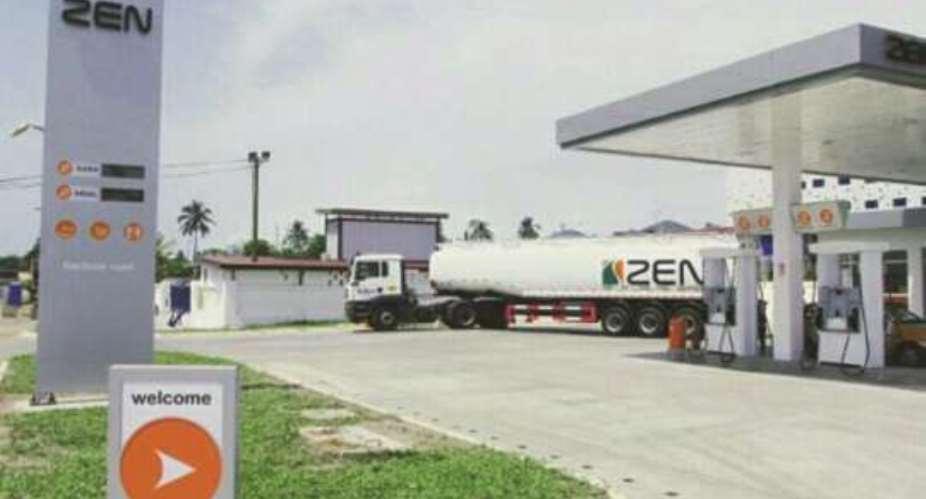Takoradi, July 27, GNA - The management of Zen Petroleum Limited, the fourth largest oil marketing company in the country, has introduced to the market low sulphur diesel.
This was in accordance with the National Petroleum Authority's (NPA) directive to move Ghana from 3000 parts per million sulphur diesel content to 50 parts per million (ppm).
The company, has imported11 million litres of 38 ppm Low Sulphur Diesel for its customers, making it the first oil marketing company (OMC) to adhere to the NPA instructions to OMCs to turn to such low sulphur products by August 1.
The use of low sulphur diesel in the vehicular sector is to help control air pollution and associated health implications that come with high sulphur content.
Mr Nicolas De-Heer, Corporate Affairs and Branding, Zen Petroleum told the Ghana News Agency in an interview that, 'The company is happy to have taken the lead to support the National Petroleum Authority directive to move from 3000 ppm Sulphur Diesel to Low Sulphur Diesel in Ghana.'
The Low Sulphur Diesel fuel would facilitate the use of advanced cleaner technology engines and vehicles in Ghana, resulting in significantly improved air quality.
He said the feat was achieved together with Bulk Distribution Companies and BP Trading, to deliver superior consumer experience with premium quality fuel and lubricants and an unmatched customer service.
'Our company worked with its supply chain partners to design a competitive value chain for Zen Low Sulphur Diesel, which will ultimately reduce downtime and overall cost of ownership for motor vehicle and equipment owners', he added.
The Corporate Affairs Manager said the commercial sector was key to the operations of the company.
'This is a sector where high technology engines are mostly used, requiring the best in fuel quality and that is why we spend quality resources working with suppliers and deploying systems to ensure that only the cleanest quality diesel is supplied to its consumers.'
Mr De-Heer lauded the move by the NPA to introduce Low Sulphur Diesel into the country, adding that Children and the elderly are most at risk when it comes to breathing related health problems as a result of high sulphur emission into the air.
He said, currently most vehicles with advanced emissions control devices perform poorly when run on the high sulphur diesel available.
This has forced some vehicle franchisees to avoid introducing such high technology vehicles in Ghana.
Mr De-Heer said Ghana would be the winner with the move to Low Sulphur Diesel by the NPA.
He said the company would continue to provide the best value in fuels and lubricants to extend engine life, reduced ventilation cost in underground mines, improved fuel economy, air quality, health and improved lubricants performance.
The NPA, directed that effective July 1, petrol and diesel imported into the country must have a maximum sulphur content level of 50 Parts Per Million (ppm).
In October last year, the NPA revised the national sulphur specification for diesel from maximum 3000 parts per million (ppm) to 500 ppm.
According to the NPA, whilst the revised national specification will be at 500 ppm, suppliers of fuel could import ultra-low-sulphur-diesels to Ghana as pertains in Europe.
The directive followed recent concerns over the harmful effects of substandard diesel which contained excessive sulphur contents than is permitted in Europe and other countries across the globe.
Health studies show that exposure to diesel exhaust especially that of toxic diesel, primarily affects the respiratory system and worsens asthma, allergies, bronchitis, and lung function, increase the risk of heart problems, premature death, and lung cancer.
GNA
By Mildred Siabi-Mensah, GNA





 Adu Boahen’s murder: Police arrest house help who was in possession of deceased’...
Adu Boahen’s murder: Police arrest house help who was in possession of deceased’...
 Akufo-Addo nominates Felicia Attipoe as Tema West MCE
Akufo-Addo nominates Felicia Attipoe as Tema West MCE
 Election 2024: I can't have someone I defeated twice as my successor – Akufo-Add...
Election 2024: I can't have someone I defeated twice as my successor – Akufo-Add...
 We’ll protect state wealth from opaque deals – Prof Jane Naana
We’ll protect state wealth from opaque deals – Prof Jane Naana
 Mauritania president says running for second term in June polls
Mauritania president says running for second term in June polls
 I won't ever say I was a mere driver’s mate' — Prof. Opoku-Agyemang
I won't ever say I was a mere driver’s mate' — Prof. Opoku-Agyemang
 2024 polls: 'EC struggling to defend credibility'— Prof. Opoku-Agyemang
2024 polls: 'EC struggling to defend credibility'— Prof. Opoku-Agyemang
 NPP will remain in gov’t till Jesus comes — Diana Asamoah
NPP will remain in gov’t till Jesus comes — Diana Asamoah
 Sunyani Technical University demands apology from former SRC president over sex-...
Sunyani Technical University demands apology from former SRC president over sex-...
 'Dumsor' was resolved by Mahama but ‘incompetent' Akufo-Addo has destroyed the g...
'Dumsor' was resolved by Mahama but ‘incompetent' Akufo-Addo has destroyed the g...
